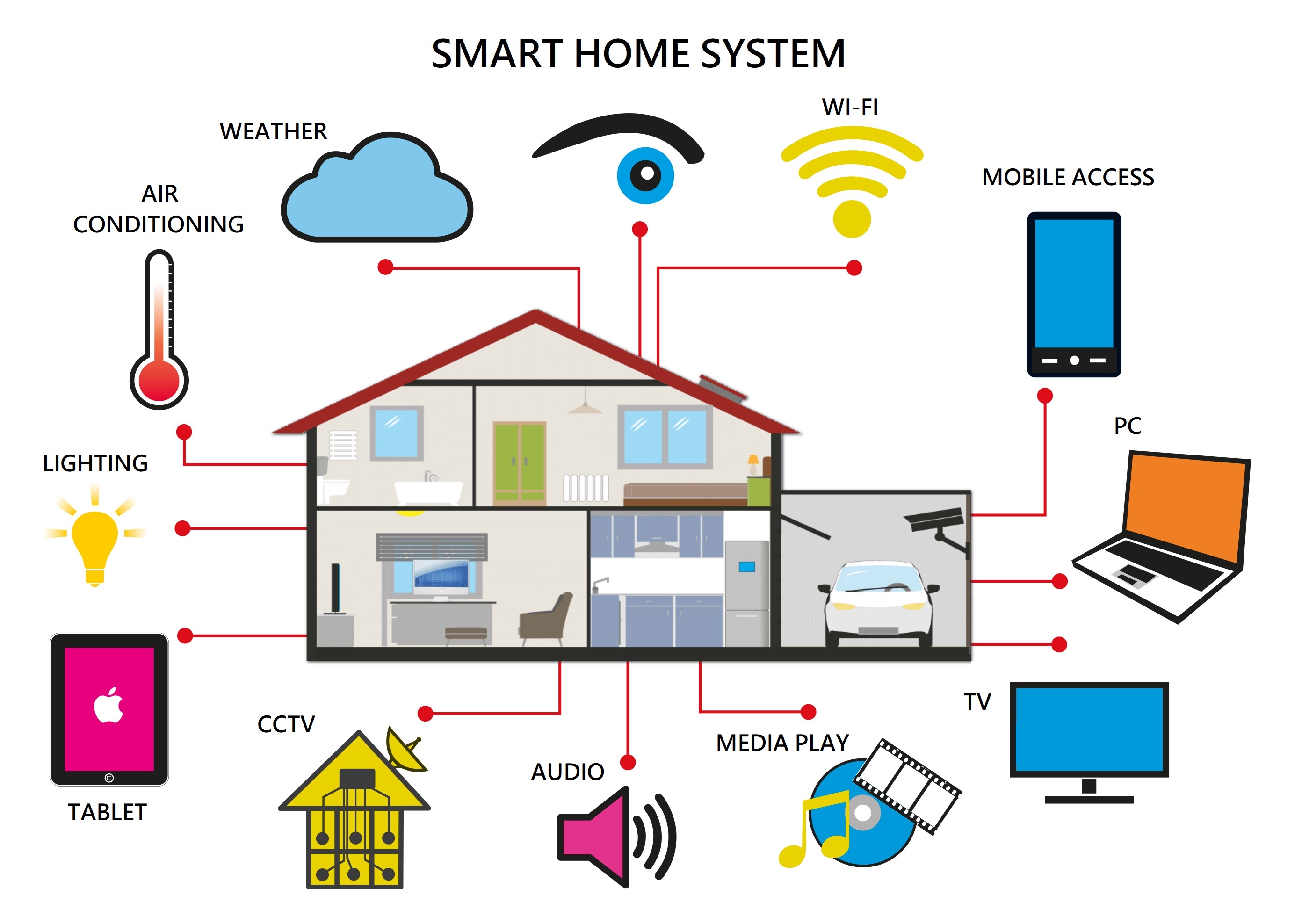What do you guys think of the idea of smart homes? I could make a basic setup using https://home-assistant.io to control my home temperature and lighting; the tools for doing this are everywhere nowadays and implementation doesn’t seem too horrific anymore.
But setting aside what I “can” do, is this something that I “should” do? How can a person implement this without connecting any devices to the internet?
A nice place to discuss rumors, happenings, innovations, and challenges in the technology sphere. We also welcome discussions on the intersections of technology and society. If it’s technological news or discussion of technology, it probably belongs here.
Remember the overriding ethos on Beehaw: Be(e) Nice. Each user you encounter here is a person, and should be treated with kindness (even if they’re wrong, or use a Linux distro you don’t like). Personal attacks will not be tolerated.
Subcommunities on Beehaw:
This community’s icon was made by Aaron Schneider, under the CC-BY-NC-SA 4.0 license.
- 0 users online
- 26 users / day
- 247 users / week
- 643 users / month
- 1.28K users / 6 months
- 1 subscriber
- 1.67K Posts
- 28.2K Comments
- Modlog










The rate at which the go obsolete is my issue. If you invest in a system, just be prepared to replace everything every five years, and there is almost nothing yoiu can ‘fix’…it is all disposable.
I really like this statement I heard recently, which I think came from the YouTube Adventurous Way - “Dumb Control, Smart Monitoring”. Make sure that any devices you install have failure models that make sense - you should still be able to control your appliances when the network is down.
That said, the option to remotely control lights, etc is fantastic. I also recommend setting up some temperature sensors in various places - I have quite a few ESP33 boards scattered around with sensors (and and one with an IR blaster) attached.
As others have said, you can sequester IoT devices to a VLAN that has no internet access. Most of the common devices (lights, switches, sensors) added to smart homes work perfectly fine without access to the internet. Voice assistants are the biggest security/privacy hole since all commercial options are from big tech companies and phone home constantly. If you set up a local homeassistant instance you can get a ton of functionality out of smart devices with no direct connection to the internet. You need to decide how you handle accessing homeassistant from outside your home if that’s something you want but there are plenty of options to choose from for that.
One thing I will say that I refuse to add to my home is any kind of smart locks. No matter how much I trust my security setup, I don’t trust it with the ability to unlock my doors. If there was one that could only lock them electronically but required being manually unlocked, them maybe. But I haven’t seen a lock like that out there.
Agreed on all points.
I just wanted to add that I’m very glad smart locks exist. My friend with cerebral palsy can now secure his home with a lock and be able to get back in independently.
In general, smart devices are huge for him, and others with physical disabilities.
Also, I should say that I really enjoy the convenience of having Google Assistant in the house. Verbal timers, alarms, reminders, podcasts, and music mostly. Those and the pirate FireTV Stick are our only devices to date. I just don’t care enough to put the legwork in to getting IoT set up. Switches are fine.
That’s great that they help your friend like that! As someone that doesn’t face any kind of accessibility issues myself, it’s easy to overlook those kinds of benefits that these devices can provide. In situations like your friend’s, I’d agree that any potential security cons are outweighed by the pros (especially if the alternative before was having to leave the doors unlocked anyways).
Agree on the convenience of voice assistants. I’ve got various models of Google homes in my house that I use for voice controls on anything I don’t have a good way to truly automate. Different people will have different tolerances for how okay they are with the data things like that can gather. One day I might try to set up one of the local network voice assistants but those can take a lot of work to get just right. Always a tradeoff of convenience and privacy.
Oh that’s interesting. Does Google Home work on an unconnected VLAN for lights? I use it for lights and kitchen timers. I don’t see myself adding anything more complicated or invasive though.
I don’t think Google home would work without an internet connection. I believe google devices and the google home app expect a connection to Google’s servers.
I personally use homeassistant to control everything without an external internet connection and I know you can lock Philips Hue lights off from the internet and the official Hue app will still work.
I have a smart home. I run Unraid OS on my server and among a ton of dockers, I run my own VM with home assistant. Been doing my own DNS, network wide ad blocking, media server, home automation stuff for years now. Always will to help answer any questions.
I’m also disabled so the smart home really helps me.
As a fellow disabled person, so much this. Being able to automate things or access them with a simple voice command (or on my phone) takes a lot of weight off my shoulders.
Smart homes in centralized hands, such as Google? Nightmare.
Smart homes controled from your home, like home assistant? Awesome. I have home assistant and done some lights, water sensor, even my security cameras. It’s a lot of work, but it works so well it’s crazy.
I sorta wonder about these when selling the house to the next person. What if a little old lady buys your house?
I thought I’d remove them if the buyer isn’t interested. They still work like normal light switches without a smart home hub.
You can connect devices locally now. Eg. Zigbee/Z-wave network protocol without the need to use the internet. I know some builders started to implement smart devices for Apartments in the city which is easy to set the standards but for individual homes, would be harder to sell as it’s costly…
I have a smart home and let me give you some advice. **BE MINDFUL OF THE BRANDS YOU CHOOSE. ** For example, using tuya smart devices with home assistant is a pain, you have to setup a tuya cloud account and get an API key that you’ll have to renew every few months. If the device gets reset you have to go back into the cloud environment and re-add them. It’s such a pain. Almost anything works with home assistant, but the amount of diy and bullshit you have to deal with to get something working varies greatly between brands. I highly recommend sonoff, also get a zigabee controller for home assistant as its far better than using WiFi. I also recommend you start a notion document or some other form of document that can keep up with everything for you. What brand of switches are in what room, what brand of lights are where, etc. Not just for you but if you ever sell your home you can give it to the next guy. Because you’re probably not going to take the light switches or any in line relays with you.
Also to not connect to the internet you need to have a separate network (router or access point) that all your smart devices connect to. You’ll then use a VPN to connect to your home network remotely. Basically have your smart devices router hooked into your normal router and on your normal router block external traffic (the Internet) from going to the smart devices router. Sorry if that’s hard to follow but just Google “how to segment a home network” and that should get you started. Feel free to hmu if you need some guidance.
This is my current biggest gripe. You have to have a four year degree in random smart home garbage to figure out what works with what. We have a guy like that in our friend group, but I still need four different smart home apps just to control a handful of lights and a couple cameras. The apps have constant problems (Nest app signs me out nearly daily), the aggregator apps like Homekit and Google Home are missing nearly all features for the lights we have aside from on or off and some simple color settings, Nanoleaf app claims to be able to do scheduling and automation but I’ve never gotten it to work. I bought a google home tied-in tablet at the recommendation of said friend to be able to check cameras and control lights from a device that didn’t have to be biometrically locked, and it turned out it couldn’t see the cameras OR the lights. Pending some future theoretical update which still hasn’t rolled out. Insanity. Makes me want to throw it all out.
Considering how expensive the smart home items are, especially the lights, the user experience is horrendous for pretty much everything but flashy tech demos.
I wish segmenting your IOT devices on their own virtual network was easier for most people to do. It can be done but you need a good working knowledge of firewall rules and networking in general.
LocalTuya is a thing, though it’s a bit of a pain in the ass and I would definitely not recommend buying Tuya hardware specifically to use with it.
I’ve been using homeassistant since the start of the year and I’m never going back! Took a while to get the hang of it but being able to make my own smart electronics on the cheap is bloody awesome. Soldered my plug-in cannabis vape to an ESP32 microcontroller and now I can control its temperature from my phone!
None of my smart-home stuff is closed source which helps a lot with trust, and I’ve even tested it to ensure that everything works even if my flat’s internet goes down! Having all my light bulbs running the FOSS WLED firmware also means that I can hook them up to my HyperHDR setup so all the lighting in my room changes colour to match my TV.
I’m super interested in all these projects! Would you mind sharing guides you found helpful when designing and building then?
For HyperHDR I started with this guide along with a bunch of YouTube tutorials and a lot of trial and error given it was my first time soldering and first time using a microcontroller in a project!
With the cannabis vape I basically used the skills I learned making my HyperHDR setup along with a multimeter and the EspHome documentation (and even more trial and error) to emulate the potentiometer that was originally wired to the temperature controller and to control an LED I wired up to it.
Other than the official documentation the main thing that I found super helpful was the official HomeAssistant forums and (unfortunately) Reddit.
Thank you so much for all these details, this will help a ton! I taught myself to solder a few years ago to do custom LEDs in my kitchen and kid’s bedroom, and it was super fun. I’m really excited to try out some of the stuff you did, thanks again!
Yeah no. As a former IT guy the last thing I want is be tech support for my family’s light switch
In theory it’s awesome, but in practice it’s a Black Hat heaven
Harmful, IMO.
Anywhere “smart” objects are, surveillance can also be. I’ve read 1984 enough times to know I don’t want a telescreen on every available surface.
This depends. You can be smart about it. Running your own servers, including your own NVRs for video storage. Have dedicated VLANs. Firewalls. Etc. it’s not that bad.
Granted I work in automation and robotics and now networking so I’d say I’m for sure a giant add nerd. For a normal user it can be hard to stay safe.
Yeah - it can be done safely. That’s way too much effort for me, lol :) I’ll stick to my low-tech doorbells and stuff.
AIRGAP EVERYTHING.
I love my smart lights. It’s convenient controlling my lights with my voice and setting up automation rules for them.
Yes, there’s some privacy concerns. Personally, I just assume it might happen and consider it worth it. Honestly, I just don’t really care much if Phillips knows when I turn my lights on. I mean, my neighbours can figure that out just by looking at my place.
One of the biggest improvements I noticed after switching to smart lights and home assistant was how much better my sleep got when I used a circadian light cycle. I don’t think we realize how important the gradual shift is in triggering the release of sleep chemicals (not my field lol, just my experience).
Just a fun aside take a look at WLED for LED controls. My use case is not particularly practical but they are pretty cheap and lots of fun. That said I bet some smart folk have probably used it for various sorts of indicator lights.
I know some people with privacy concerns will go out of their way to avoid any “smart” devices that communicate over WiFi. If you stick with Z-Wave/ZigBee/Matter, you don’t have to worry about any sort of external communications. I mean, even with WiFi devices you can isolate them by making a separate local-only network, but that’s a pain.
I wouldn’t trust any closed source WiFi smart devices but IMO ones that run a FOSS firmware and are fully functional with no internet connection are all good